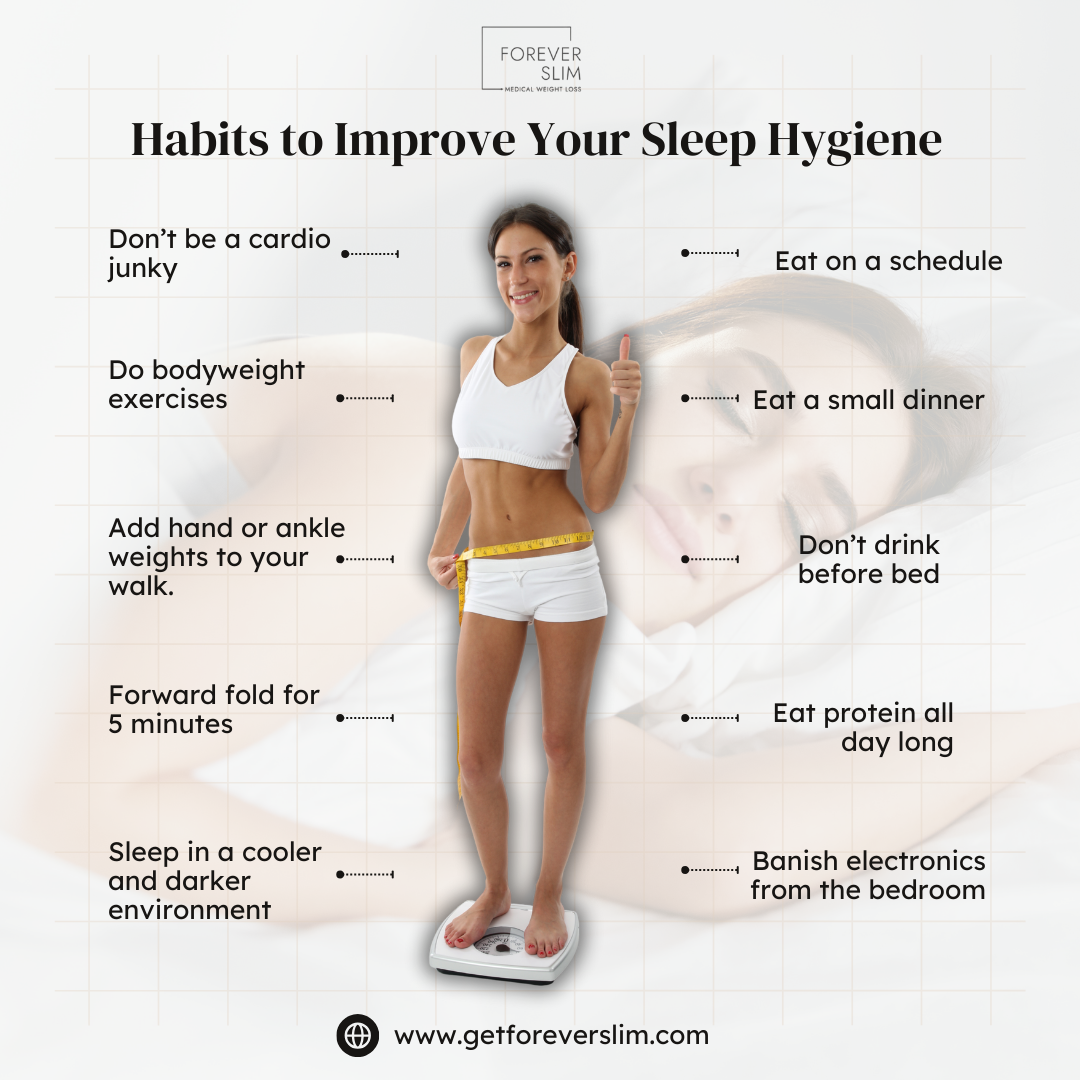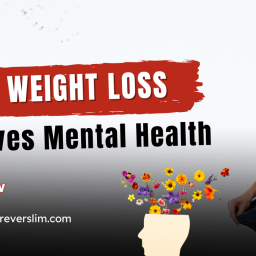
Why is Sleep So Important?
Sleep is essential for optimal health and well-being. During sleep, the body restores and rejuvenates itself, and the brain processes and consolidates memories and learning. Like exercise and a balanced diet, adequate sleep may help prevent a range of health issues. Getting a good night’s sleep is essential for weight loss and more
Adequate sleep helps reduce stress, anxiety, and depression and improves mood and cognitive function. In addition to that, getting enough sleep helps to improve coordination, and balance, and makes it easy to carry out daily activities safer and more efficiently.
By prioritizing sleep, individuals can improve their physical and mental health, increase productivity, and enhance their general quality of life. Not getting enough sleep is associated with short and long-term health consequences including difficulty in memory processing and formation.
What is the Relationship Between Sleep and Weight Loss?

The relationship between sleep and weight loss is quite straightforward. Sleep is important to regulate the hormones that affect hunger and appetite. Most people need between 7 and 9 hours of sleep each night to enjoy its health benefits.
Habits to Improve Your Sleep Hygiene
Get enough sleep
Getting enough sleep is a good habit to improve your sleep hygiene. To get enough sleep, you need to stick to a sleep schedule. This helps to strengthen your body’s sleep cycle.
Sticking to a consistent schedule may also help reduce daytime sleepiness which can make it easier for you to fall asleep at night. Make sure that your bedtime schedule allows you to get 7– 8 hours of sleep each night.
Don’t be a cardio junky
Research has shown that regular exercise can make it easier to sleep at night. However, it’s important to avoid anything too energetic 1-2 hours before your bedtime. Avoid vigorous cardio exercise within 2-3 hours of bedtime, as it can interfere with sleep.
Light cardio exercise can improve sleep for many people but avoid anything too intense when you’re preparing for sleep.
Do bodyweight exercises
Bodyweight exercises can help improve sleep quality. Bodyweight exercises are a great way to get regular physical activity to boost your sleep hygiene without requiring any equipment or gym membership.
Remember to finish your bodyweight exercises a few hours before bedtime to allow your body to wind down and relax before sleep.
Add hand or ankle weights to your walk.
Adding hand or ankle weights to your walk can potentially help improve sleep quality. This is because adding these extra weights can increase the intensity of your workout and provide additional benefits such as letting you enjoy a quality night’s sleep.

Forward fold for 5 minutes
Forward folding for 5 minutes can be a method to relax and stretch the body, particularly the hamstrings, calves, and back muscles. Some benefits of forward folding include relieving tension and stress, and promoting relaxation and calmness. 5 minutes of forward fold is a great way to improve your sleep hygiene.
Sleep in a cooler and darker environment
The way you set up your sleep environment before you sleep can help you fall asleep and stay asleep more easily. It’s recommended for most people to sleep in a cool and dark environment.
A bedroom temperature between 60 and 67°F (15.6 and 19.4°C) is the optimal temperature for sleeping. Fine-tune your bedroom temperature to suit your preferences, but ensure it’s on the cooler side.
Eat on a schedule
Eating on a schedule can help promote your sleep hygiene. Don’t go to bed hungry or have a heavy stomach. Avoid heavy or large meals within a couple of hours of bedtime as the discomfort may keep you up at night. Opt for a balanced, light meal that’s easy to digest. If you need nighttime snacks, go for sleep-promoting snacks like bananas and warm milk.
Eat a small dinner
Eating a large meal prior to bed may negatively affect your sleep quality. Eating a small dinner can help improve sleep quality at night. A smaller dinner reduces the load on your digestive system, allowing it to focus on relaxation rather than digestion.
Avoid heavy, rich, or spicy foods to reduce discomfort, indigestion, and acid reflux, making it easier to fall asleep. Eating a small dinner can help increase melatonin levels, the hormone that regulates sleep-wake cycles. It’s essential to choose a balanced and nutrient-rich dinner, even if it’s smaller in portion size for a quality night’s sleep.
Don’t drink before bed
Limit alcohol consumption in the evening or avoid it totally. While it might make some people feel sleepy, it usually affects the quality of sleep. In addition to alcohol, don’t drink caffeine in the afternoon or evening to enjoy a good night’s sleep.
Eat protein all day long
Eating protein throughout the day can potentially improve night sleep. Protein helps regulate blood sugar levels, which is essential for a restful night’s sleep.
Protein-rich foods contain tryptophan, an amino acid converted into serotonin and melatonin in the brain, to promote relaxation and sleep. Consuming protein too close to bedtime can also interfere with sleep, as it can stimulate the brain.
Banish electronics from the bedroom
Electronic devices like your phone emit blue light that reduces melatonin levels in the body. Pressing the phone during nighttime can keep you awake. Electronic devices that emit blue light also keep your brain alert, making it harder to fall asleep. Keeping your phone near your bed can also disrupt your sleep due to message notifications, and buzzing.
Go to bed early
Going to bed early can give you some quiet time to relax, read, or meditate before sleep. Doing this can help you get more restful sleep and improve the quality of your sleep.
Improve Your Sleep For Weight Loss and Beyond
Getting a good night’s sleep is essential for weight loss and more. Research suggests that going to bed early and getting quality sleep can help promote weight loss. Lack of sleep may affect appetite. It can also be associated with unnecessary cravings for foods rich in carbohydrates. Improving your sleep will help greatly with boosting metabolism and encouraging weight loss.
After a good night’s sleep, you also feel energized and may be motivated to go to the gym. Good quality sleep also improves cardiovascular health, combat germs, keeps the immune system strong, reduces risk of injury, and boosts memory and learning.
Best Time To Sleep To Lose Weight
It’s best to sleep early. People that sleep late tend to consume more calories, putting them at a higher risk for weight gain. Sleeping at the right time can help support weight loss.
Going to bed between 9-11 PM allows for 7-8 hours of sleep and aligns with the body’s natural sleep-wake cycle. This is to ensure you get enough sleep to regulate hunger hormones, support metabolism, and enhance weight loss.
Sleeping Position To Lose Belly Fat
Best sleeping position to lose belly fat is to sleep on your back or on your side. Sleeping on your side whether left or right side helps with sleep apnea. Sleep apnea may also cause weight gain, and sleeping on the side may help to minimize your symptoms and promote weight loss.
You can put a pillow between your knees to keep your spine aligned. If you get shoulder pain while sleeping on your side, you can roll over from time to time and avoid spending the whole night on the same side.
Can sleep disruption impact weight loss?

Yes, sleep disruption can impact weight loss. If you’re trying to lose weight, poor sleep can undermine your weight loss efforts. Sleep disruption can result in unhealthy food choices, increased hunger and calorie intake, and diminished physical activity.
Join the Best Weight Loss Clinic Program at Forever Slim in Little Elm, TX
Whether you need to lose a few pounds or you want to lose significant weight, Forever Slim can help you achieve your goals. Our medical weight loss program in Little Elm, TX includes advanced interventions, such as prescription weight loss medications and personalized exercise and diet programs.
You will be supervised by a team of experts that includes a clinician that assesses and treats possible medical causes for your weight gain. We tailor your weight loss program according to your needs and goals, ensuring that you achieve your desired results.
Contact us today or schedule an appointment with us at Forever Slim to get a supervised medical weight loss program in Little Elm, TX so you can achieve your desired body weight and physical appearance.















